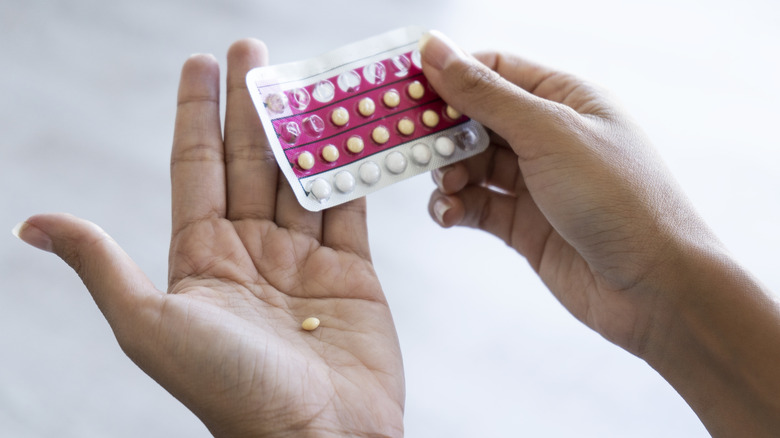This Common Medication Has An Unexpected Effect On Your Cholesterol
Both low-density lipoprotein (LDL) and high-density lipoprotein (HDL) measurements must be taken into account in order to get a well-rounded picture of our cholesterol health. Ideally, you want to see lower levels of LDL, the "bad" cholesterol, and higher levels of HDL, the "good" cholesterol.
If you're someone with high cholesterol, it's possible that your medications may be a contributing factor. Diuretics, antivirals, retinoids, anti-seizure medications, corticosteroids, and some blood pressure drugs can cause an increase in your cholesterol levels (per WebMD).
As it turns out, one particularly common medication — birth control pills — can impact your cholesterol, too. According to the U.S. Centers for Disease Control and Prevention (CDC), between 2015 and 2017, nearly 65% of women between the ages of 15 and 49 were using some form of birth control. 12.6% of these women preferred the use of oral contraceptives. While some birth control pills may increase cholesterol levels, science shows that others may actually lower it, reports the Mayo Clinic.
Some types of birth control may increase cholesterol
Most birth control medications are made up of estrogen and progestin, which together, block the development of a woman's egg in order to prevent pregnancy, according to the Mayo Clinic. Each of these hormones has its own responsibilities. Progesterone is what stops ovulation and estrogen controls bleeding during one's period (per StatPearls). While some birth control pills only contain progesterone, the combination pills are more frequently prescribed.
Experts at WebMD state that some birth control pills may produce decreases in good cholesterol and increases in bad cholesterol and triglycerides. A 2012 study published in the Pakistan Journal of Biological Sciences found this to be partially true, in which oral contraceptive use was linked with boosts in HDL, LDL, total cholesterol, and triglyceride levels. However, research published as early as 1996 in Contraception Report points out that although oral contraceptives alter the lipid profile, these changes are minor and do not place a patient at increased risk for high cholesterol-related heart disease.
Greater amounts of estrogen may benefit cholesterol
There is also evidence to suggest that birth control pills with greater amounts of estrogen may improve cholesterol levels, although not enough to produce a substantial change in one's health status, explains the Mayo Clinic. Researchers from a 2022 scientific review in JAMA Network Open highlight how estrogen alters lipid metabolism in the liver and regulates serum lipoprotein levels, which produces drops in bad and total cholesterol levels while heightening good cholesterol and triglycerides. Because of the role cholesterol plays in the development of cardiovascular disease, estrogen's potentially protective properties were also referenced in the previously mentioned 1996 oral contraceptives study.
Should you have any concerns regarding cholesterol and birth control use, be sure to talk to your doctor. It's important to take a well-rounded approach to managing cholesterol levels. This includes maintaining a healthy weight; making exercise a part of your regular routine; and eating foods that are good for our heart like whole grains, vegetables, and fish.



